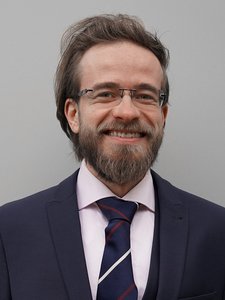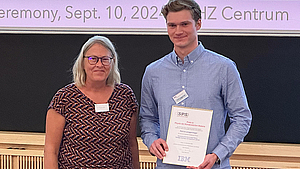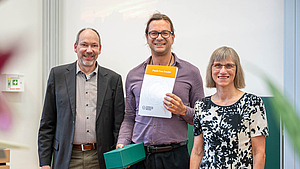
Archived Awards and Honors
Awards and Honors
Libor Šmejkal awarded the Walter Schottky Prize
Libor Šmejkal, group leader at the MPI-PKS jointly with MPI-CPfS, has been awarded the 2025 Walter Schottky Prize by the German Physical Society (DPG) "for his prediction of altermagnetism, a new class of magnetic order with diverse fundamental and application-oriented perspectives".
Libor Šmejkal was the first to demonstrate the phenomenon of altermagnetism. It is a new fundamental magnetic phase exhibiting a spin-polarized d/g/i-wave order in the non-relativistic band structure, thus differing significantly from conventional ferromagnetism and antiferromagnetism. Previously, the understanding of conventional ferromagnets and antiferromagnets was considered very complete, so Šmejkal's discovery came as an unexpected turn in the scientific community.
Libor Šmejkal was educated at Charles University in Prague under the supervision of Tomas Jungwirth and Jairo Sinova (Mainz), where he received his PhD in 2020. Subsequently, he headed an independent research group at Johannes Gutenberg University Mainz and, since 2024, has been the head of an independent research group at the Max Planck Institute for the Physics of Complex Systems in Dresden.
The Walter Schottky Prize is awarded by the German Physical Society (DPG) for outstanding work published within the last two years, preferably in the past year, in the field of solid-state physics by one or more young physicists. The prize consists of a €10,000 award and a certificate.
weiterlesenLibor Šmejkal was the first to demonstrate the phenomenon of altermagnetism. It is a new fundamental magnetic phase exhibiting a spin-polarized d/g/i-wave order in the non-relativistic band structure, thus differing significantly from conventional ferromagnetism and antiferromagnetism. Previously, the understanding of conventional ferromagnets and antiferromagnets was considered very complete, so Šmejkal's discovery came as an unexpected turn in the scientific community.
Libor Šmejkal was educated at Charles University in Prague under the supervision of Tomas Jungwirth and Jairo Sinova (Mainz), where he received his PhD in 2020. Subsequently, he headed an independent research group at Johannes Gutenberg University Mainz and, since 2024, has been the head of an independent research group at the Max Planck Institute for the Physics of Complex Systems in Dresden.
The Walter Schottky Prize is awarded by the German Physical Society (DPG) for outstanding work published within the last two years, preferably in the past year, in the field of solid-state physics by one or more young physicists. The prize consists of a €10,000 award and a certificate.
Awards and Honors
Patrick Lenggenhager receives SPS thesis award
Every year, the Swiss Physical Society (SPS) awards a few young physicists for outstanding research work during their doctoral studies. This year, Patrick Lenggenhager, who joined MPI-PKS last year as a postdoc, is the recipient of the SPS award for condensed matter physics. In his doctoral thesis, Patrick explored multigap topology and hyperbolic lattices, two emerging avenues in band theory that are tied together by the overarching concepts of symmetry and topology. His findings advance the state of the art in these two key frontiers and underscore the centrality of band theory as a tool to uncover novel physical phenomena. We would like to congratulate Patrick on this impressive achievement and celebrate his contributions to condensed matter physics, which are sure to grow even larger in the coming years!
weiterlesenAwards and Honors
Libor Šmejkal receives ERC starting grant
The European Research Council (ERC) has announced prestigious starting grants to researchers to set up their own teams and conduct research on the topics of their choice. One of these researchers is Libor Smejkal, a new group leader at MPI-PKS & MPI-CPfS, with his successful proposal on "Magnetic counterparts of unconventional superconductors for spin-conserved and non-dissipative electronics". The project will explore topological and quantum variants of unconventional magnets that are analogues to unconventional superfluids and superconductors. Libor's group will also search for realistic material candidates enabling low-dissipation electronics based on the unconventional magnetism. Congratulations!!
weiterlesenAwards and Honors
Prof. Matthieu Wyart awarded the "Physik Preis Dresden 2024"
On 18 June 2024, the French physicist Prof. Matthieu Wyart (EPFL, École Polytechnique Fédérale de Lausanne) was awarded the Physik Preis Dresden 2024. The theoretical physicist is being honoured for his pioneering contributions to various problems of complex systems, in particular the theory of financial markets, the physics of disordered and glassy systems as well as the theory of neural networks and machine learning. The Physik Preis Dresden is awarded annually jointly by the Dresden University of Technology and the Max Planck Institute for the Physics of Complex Systems (MPI-PKS).
Matthieu Wyart completed his PhD in Paris in 2005, where he worked together with J.-P. Bouchaud. During this time, he developed a model of price response functions in electronic markets, which became a standard in the industry. In the field of physics of disordered systems, he made an important breakthrough very early on by explaining how the surplus of soft modes in closely-packed systems of particles is controlled by their disordered geometry. This work elegantly solved the long-standing problem of the origin of the so-called boson peak in glasses with repulsive interactions. As a postdoc, he moved to Harvard and then Princeton before becoming an assistant and associate professor at New York University. He has been a professor at EPF Lausanne since 2015.
In recent years, Matthieu Wyart's original approaches and way of reasoning have had a strong impact and brought new insights into the physics of disordered systems. More recently, he has made significant contributions to the problem of the nature of the glass transition. In particular, his work suggests that increasing local energy barriers control the slowing down of dynamics in supercooled liquids, as opposed to co-operative effects.
The numerous original approaches to solving problems in different fields and disciplines are testimony to his extraordinary scientific excellence. In recognition of his outstanding contributions to the physics of complex and disordered systems, the Dean of the Faculty of Physics at Dresden University of Technology, Prof. Gesche Pospiech, together with Prof. Frank Jülicher, Director at the MPI-PKS, awarded the Physik Preis Dresden 2024 to Matthieu Wyart on 18 June 2024 as part of the Physics Colloquium.
The Physik Preis Dresden, endowed with 5,000 euros, was founded in 2015 by the Dresden physicist Prof Peter Fulde (1936-2024), the founding director of the MPI-PKS, and has been awarded annually to renowned scientists since 2017. The award winners are selected by a joint commission of the Dresden University of Technology and the MPI-PKS. In addition to the central criterion of scientific excellence, it is particularly important for the decision that the work of the award winners is of particular importance for the cooperation between the two DRESDEN-concept partners MPI-PKS and TUD and that their connection has been further strengthened in the long term.
weiterlesen



